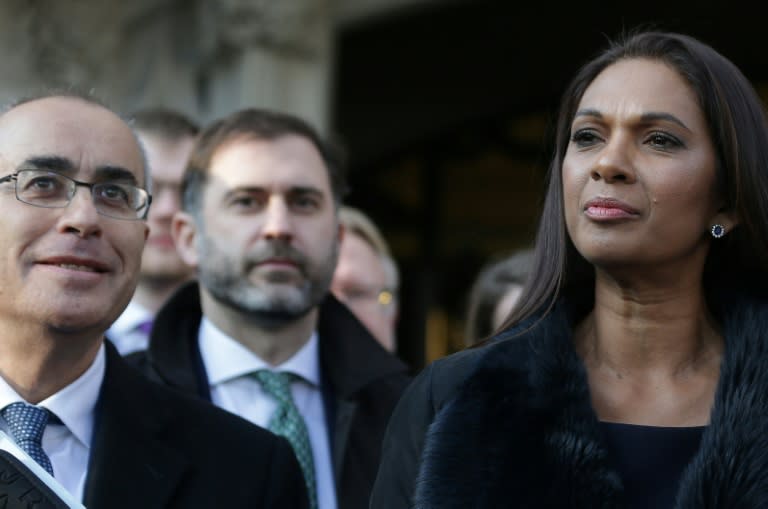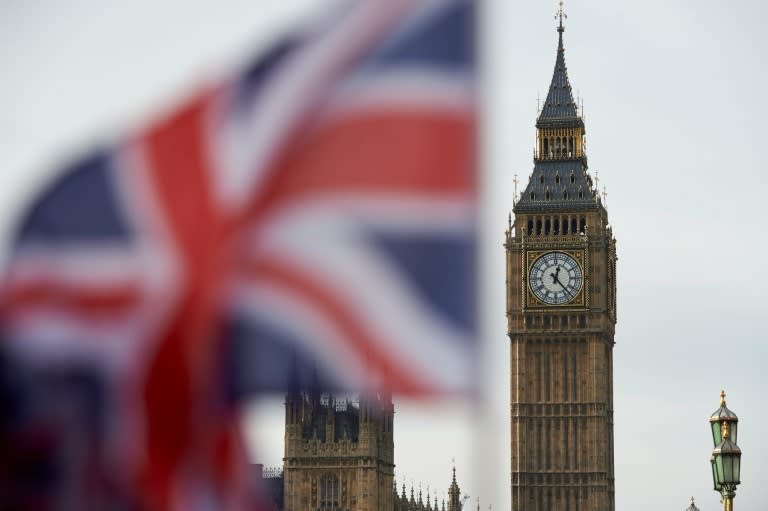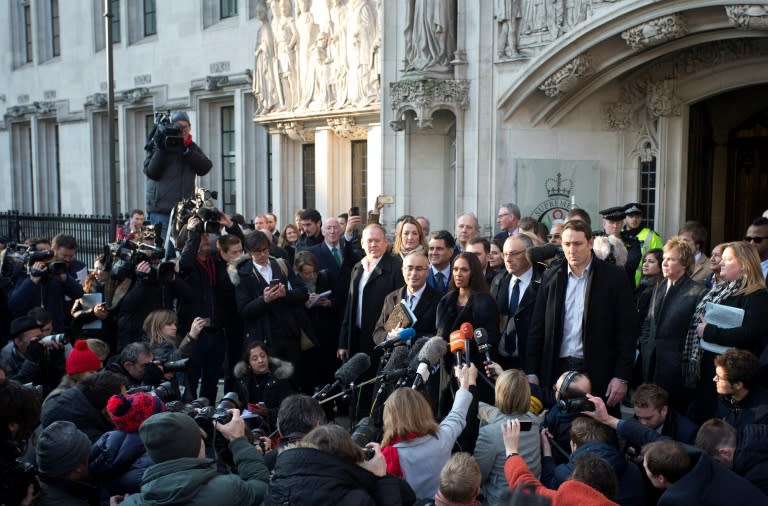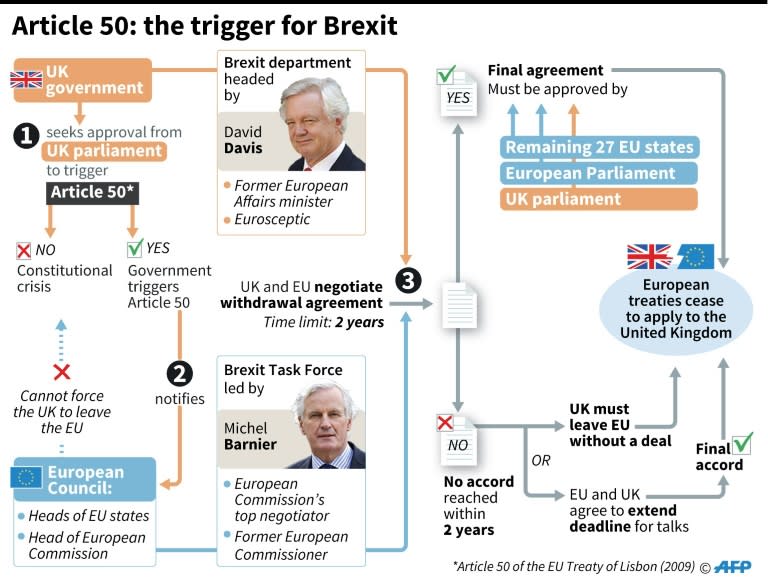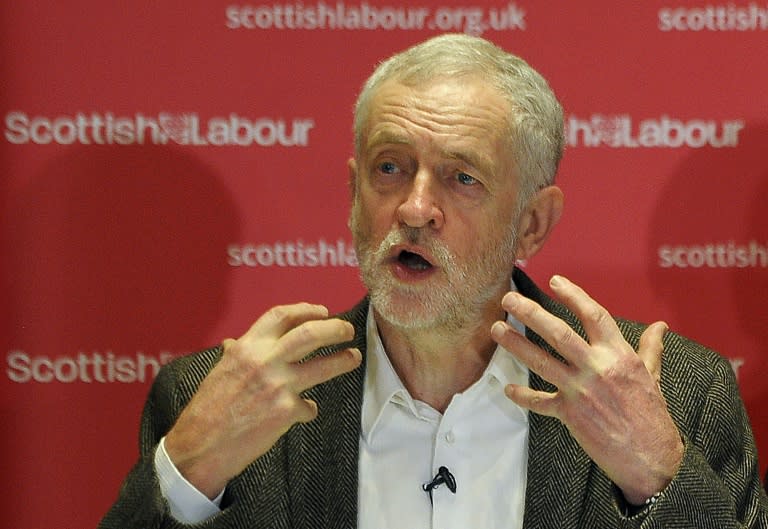British government readies for Brexit bill after court ruling
The British government is set to propose legislation to push Brexit through parliament following a landmark court ruling on Tuesday seen as a setback for Prime Minister Theresa May. The Supreme Court judgement found the government must win parliament's approval before starting talks for Britain to leave the European Union, following the country's divisive referendum which saw 52 percent vote to leave the bloc. May had wanted to start the Brexit process -- invoking Article 50 of the EU treaty -- without a vote in parliament, but she failed to overturn a High Court ruling that said lawmakers must be consulted. "The Supreme Court rules that the government cannot trigger Article 50 without an act of parliament authorising it to do so," Supreme Court president David Neuberger said in London. A majority of the 11 judges agreed that withdrawing from the EU meant there would have to be changes to Britain's domestic laws, and therefore the national parliament had to be involved. - 'Nothing' changes in timetable - May's government insisted "nothing" would change the timetable for triggering Article 50 by the end of March and promised draft legislation "within days". "I trust no-one will seek to make it a vehicle for attempts to thwart the will of the people or frustrate or delay the process," Brexit minister David Davis warned MPs in a defiant statement. The government aims to publish the bill on Thursday, sources told the BBC and other UK media. The main opposition Labour party and the Scottish National Party (SNP) have said they will table amendments to any government legislation to start Brexit, which could potentially cause a delay. One of the prime minister's harshest backbench critics, Nicky Morgan, warned the government that full collaboration with lawmakers would prove essential. "I would say to the government -- to avoid any difficulties at the end of the process, in terms of signing off on a final deal, parliamentary involvement and security throughout the two-year process is absolutely essential," Morgan, a Conservative MP who has campaigned to retain strong ties to the European Union, told AFP. - Scottish independence? - While Tuesday's ruling was a blow to the prime minister, the judges also said lawmakers in semi-autonomous Scotland, Northern Ireland and Wales had no legal right to be consulted in the process. Scottish First Minister and SNP leader Nicola Sturgeon had argued that since Scotland voted to stay in the EU, it should not be taken out "against its will" and has warned it is "very likely" she will have to call a referendum on independence. "Is it better that we take our future into our own hands? It is becoming ever clearer that this is a choice that Scotland must make," she said. The lead claimant in the Supreme Court case, investment fund manager Gina Miller, hailed the ruling as a victory for parliamentary democracy. "No prime minister, no government can expect to be unanswerable or unchallenged," said Miller, who has been forced to hire bodyguards because of the death threats she has received since starting her case. In an indication of the high tensions over the ruling, senior Conservative MP Iain Duncan Smith -- a former party leader -- lanched a scathing attack, calling the Supreme Court "self-appointed". "I'm disappointed they've decided to tell parliament how to run its business," he said. - Opposition amendments - Labour leader Jeremy Corbyn said his party would not "frustrate" the process for invoking Article 50 but would seek to amend the legislation. "Labour is demanding a plan from the government to ensure it is accountable to parliament throughout the negotiations and a meaningful vote to ensure the final deal is given parliamentary approval," he said. The party wants provisions included in the bill urging the government to negotiate tariff-free access to the EU's single market and agree to abide by EU-level protection of workers' rights. May has said she wants to leave the single market in order to restrict immigration and negotiate a new customs deal with the EU, but will seek "maximum possible access" for British companies. She has also said Britain will incorporate all existing EU legislation and then parliament will get to choose which laws to adopt, repeal or amend. Meanwhile the head of the council of eurozone finance ministers said Britain would be taking a "crazy step backwards" if it tried to become a tax haven after Brexit. "This would endanger the European economy but this would also be equally bad for the England, for Great Britain to turn itself into a sort of tax haven on the fringes of Europe," Jeroen Dijsselbloem told Dutch RTL television.


